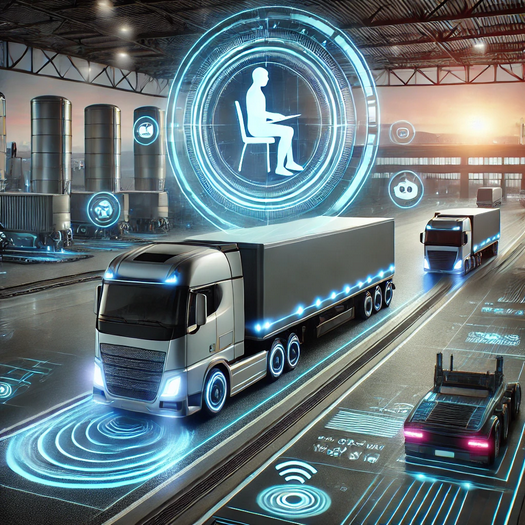The Role of Autonomous Vehicles in the Trucking Industry: Should Truck Drivers Be Worried?

The trucking industry is on the verge of a technological revolution, with autonomous vehicles (AVs) playing an increasingly significant role. As companies invest in self-driving technology to improve efficiency and reduce costs, many truck drivers wonder if their jobs are at risk. However, while AVs bring change, they are unlikely to fully replace human drivers in the near future. Instead, they will reshape the industry in ways that could provide new opportunities for workers.
How Autonomous Vehicles Are Changing Trucking
- Improving Efficiency and Safety Autonomous trucks are designed to optimize fuel efficiency, reduce human errors, and improve road safety. Advanced sensors and AI-powered navigation systems allow these vehicles to react faster than human drivers, potentially reducing accidents caused by fatigue or distraction.
- Filling the Driver Shortage The trucking industry has faced a labor shortage for years, with companies struggling to find enough qualified drivers. AV technology can help bridge this gap by handling long-haul trips, allowing human drivers to focus on shorter and more complex routes.
- Lowering Operational Costs Businesses see autonomous trucking as a way to cut costs, including fuel consumption, maintenance, and insurance premiums. These savings could lead to lower consumer prices and more investment in infrastructure and logistics.
- Reducing Environmental Impact Autonomous trucks are being designed to operate more efficiently, reducing carbon emissions and helping logistics companies meet sustainability goals.
- Enhancing Logistics Networks With the integration of AVs, supply chain efficiency will improve, reducing delivery times and making freight transportation more predictable.
Why Truck Drivers Shouldn’t Worry — Yet
- Human Oversight Remains Essential Despite advancements in automation, autonomous trucks still require human supervision. Drivers will likely transition into roles that involve monitoring systems, handling last-mile deliveries, and managing unexpected challenges on the road.
- Regulatory and Technological Hurdles Widespread adoption of autonomous trucks is still years away due to legal, regulatory, and technical challenges. Governments must establish clear guidelines, and companies need to refine the technology to ensure it works safely in all conditions.
- New Job Opportunities As automation increases, new roles will emerge in fleet management, remote vehicle operation, and maintenance of AV systems. Truck drivers who upskill in technology-related areas can transition into these high-demand positions.
- Hybrid Driving Models Many companies are testing hybrid driving models where human drivers oversee AVs during critical parts of a journey, ensuring employment remains steady.
- Potential for Higher Wages As AVs take over repetitive tasks, human drivers might be able to focus on specialized, high-value routes that pay better.
- Greater Work-Life Balance With automation reducing long-haul stress, truckers may experience better work-life balance as their roles evolve.
The Future of Trucking: A Hybrid Workforce
The future of trucking will likely involve a combination of autonomous and human-driven vehicles. Rather than replacing truck drivers outright, AVs will complement their work, improving efficiency while still requiring human expertise for critical decision-making.
Fleet operators are already investing in training programs to help drivers transition into technology-focused roles, ensuring a smoother adaptation to automation.
As the industry evolves, it will also create opportunities for technicians specializing in autonomous vehicle maintenance, software engineers developing AI-driven logistics solutions, and safety inspectors ensuring compliance with regulations.
Conclusion
While autonomous vehicles will bring significant changes to the trucking industry, truck drivers do not need to panic. Instead, they should prepare for a future where technology enhances their work rather than eliminates it. By embracing new skills and staying adaptable, drivers can continue to thrive in an evolving industry.
Those who embrace change and upskill will find themselves in demand as logistics become more tech-driven. The road ahead is full of opportunities, and truckers who are willing to evolve with the industry will find themselves better positioned for the future.
Article written by Ayoola Ashiru (CEO of Truckademy)
Comments
Post a Comment